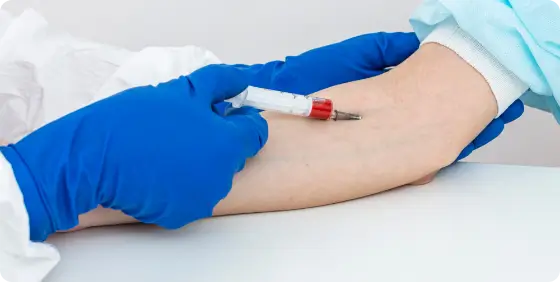what is a
stroke screening?
Stroke screening is an essential preventive health service aimed at identifying risk factors and warning signs associated with strokes. This proactive assessment involves a comprehensive evaluation conducted by healthcare professionals to assess an individual’s susceptibility to stroke.
One key component of this assessment includes the use of the NIH Stroke Scale (NIHSS), a systematic tool used to measure the severity of a stroke and identify specific neurological deficits.
By detecting potential risk factors early on, including NIHSS evaluations, it empower individuals to take proactive steps to reduce their risk of experiencing a stroke and improve their overall cardiovascular health.
what does a
stroke screening measure?
During a stroke scale test, several key parameters are assessed to evaluate an individual’s risk of stroke:
Blood
Pressure
High blood pressure, or hypertension, is a major risk factor for strokes as it can damage blood vessels and increase the likelihood of blockages or ruptures.
Cholesterol
Levels
Elevated levels of cholesterol, particularly LDL cholesterol, contribute to the buildup of plaque in arteries, restricting blood flow to the brain and increasing the risk of stroke.
Blood Sugar
Levels
Diabetes and high blood sugar levels can damage blood vessels and nerves, elevating the risk of stroke.
Body Mass
Index (BMI)
Obesity or being overweight is associated with various stroke risk factors, including hypertension, diabetes, and high cholesterol.
Smoking
Status
Tobacco use significantly elevates the risk of stroke by damaging blood vessels and promoting the formation of a blood clot.
Medical
History
A history of previous stroke patients, transient ischemic attacks (TIAs), heart disease, atrial fibrillation, and other cardiovascular conditions can increase the risk of stroke.
Family
History
A family history of stroke or cardiovascular disease may indicate a genetic predisposition to these conditions.
who is a candidate for
stroke screening?
While this screening test is beneficial for everyone, certain individuals are considered particularly high-risk and may benefit from early and regular stroke quick tests. The list of candidates includes:
- Individuals with a family history of stroke or cardiovascular disease.
- Those with existing medical conditions such as hypertension, diabetes, or atrial fibrillation.
- Smokers or individuals with a history of tobacco use.
- Individuals over the age of 55, as stroke risk increases with age.
- People with unhealthy lifestyle habits, including poor diet and lack of exercise.
- Those who have experienced previous strokes, TIAs, or heart disease.
how is a stroke screening done?
Stroke tests typically involve the following steps:
Medical History Review
Our experts gather information about the individual’s medical history, family history, medications, and lifestyle habits.
Physical Examination
A thorough physical examination is conducted to assess vital signs, neurological function, and overall health.
Blood Pressure Measurement
Blood pressure is measured to detect hypertension, a significant risk factor for stroke.


Blood Tests
Laboratory tests are performed to analyze cholesterol levels, blood sugar levels, and other relevant biomarkers.
Imaging Studies
Imaging tests such as ultrasound, CT scans, or MRI scans may be conducted of carotid arteries, abdominal aortic aneurysm, atrial fibrillation, and peripheral artery disease to evaluate blood flow, detect blockages, and check whether it’s an ischemic stroke or a hemorrhagic stroke.
understanding the results and
what happens next
Receive Screening Results
- Obtain the results from the screening tests.
- Review detailed findings from imaging tests, blood tests, and physical assessments.
Risk Factors Assessment
- Determine the overall risk of stroke based on the screening results.
- Classify the risk level (low, moderate, high) to guide the next steps.
Consult Healthcare Provider
- Schedule a follow-up appointment with a healthcare professional.
- Discuss the stroke testing results and their implications with your doctor.
- Create a personalized care plan based on the risk assessment.
- Include lifestyle changes, medication, and possible treatments.
Medications and Treatments
- Start or adjust medications as prescribed to control risk factors (e.g., blood pressure, cholesterol).
- Consider additional treatments or interventions if necessary (e.g., surgery for blocked arteries).
why choose manhattan cardiology care for stroke screening?
At Manhattan Cardiology Care, we are committed to providing exceptional care and preventive services to optimize cardiovascular health. When you choose Manhattan Cardiology Care, you can expect:
Expertise and Experience
Our team of board-certified cardiologists and healthcare professionals specializes in preventive cardiology and stroke risk assessment, ensuring that you receive the highest quality of care.
State-of-the-Art Facilities
We utilize advanced diagnostic technologies and state-of-the-art facilities to perform comprehensive tests and screenings to evaluate cardiovascular health.


Personalized Care
We recognize that every individual is unique, and we tailor our approach based on your specific risk factors, medical history, and lifestyle habits.
Holistic Approach
In addition to identifying risk factors, we focus on empowering individuals to make positive lifestyle changes through education, counseling, and support services.
Continuity of Care
Our team provides ongoing monitoring and follow-up care to ensure that you receive the support you need to maintain optimal cardiovascular health.
frequently asked questions
What Tests are Included in Stroke Screening?
Stroke screening typically includes a combination of tests and evaluations to assess the risk of stroke. Common tests involved in this screening include:
• Carotid Ultrasound
• Electrocardiogram (ECG)
• Echocardiogram
• Blood Tests
• CT Scans
• MRI
What is a Stroke Test?
A stroke test refers to any diagnostic procedure or set of procedures used to determine if an individual is having or is at risk of having a stroke. This can include imaging tests, such as CT scans or MRIs, blood tests, and evaluations of physical symptoms and medical history. Stroke tests are essential for quick diagnosis and treatment, which can significantly improve outcomes and reduce long-term damage.
What is the FAST Stroke Test?
FAST stroke tests are a quick and simple way to recognize the signs of a stroke and act promptly. FAST stands for:
Face: Ask the person to smile. Check if one side of the face droops.
Arms: Ask the person to raise both arms. See if one arm drifts downward.
Speech: Ask the person to repeat a simple phrase. Listen for slurred or strange speech.
Time: If any of these signs are present, it’s time to call emergency services immediately.
Fast stroke tests help in the early detection of stroke symptoms, enabling rapid response and medical intervention.
How does blood flow link with stroke?
Blood flow is essential for delivering oxygen and nutrients to the brain. A stroke occurs when this blood flow is disrupted, either by a blockage (ischemic stroke) or a burst blood vessel (hemorrhagic stroke, presents with severe headache), causing brain cells to die. Sudden onset of blurred or fractured vision. Maintaining healthy blood flow is crucial for stroke prevention.
Where can I find the best stroke screening near me?
Anyone searching for “the best stroke screening near me”, who’s located in or around the Manhattan area, can find premium stroke screening, as well as other cardiology testing services at Manhattan Cardiology Care.





